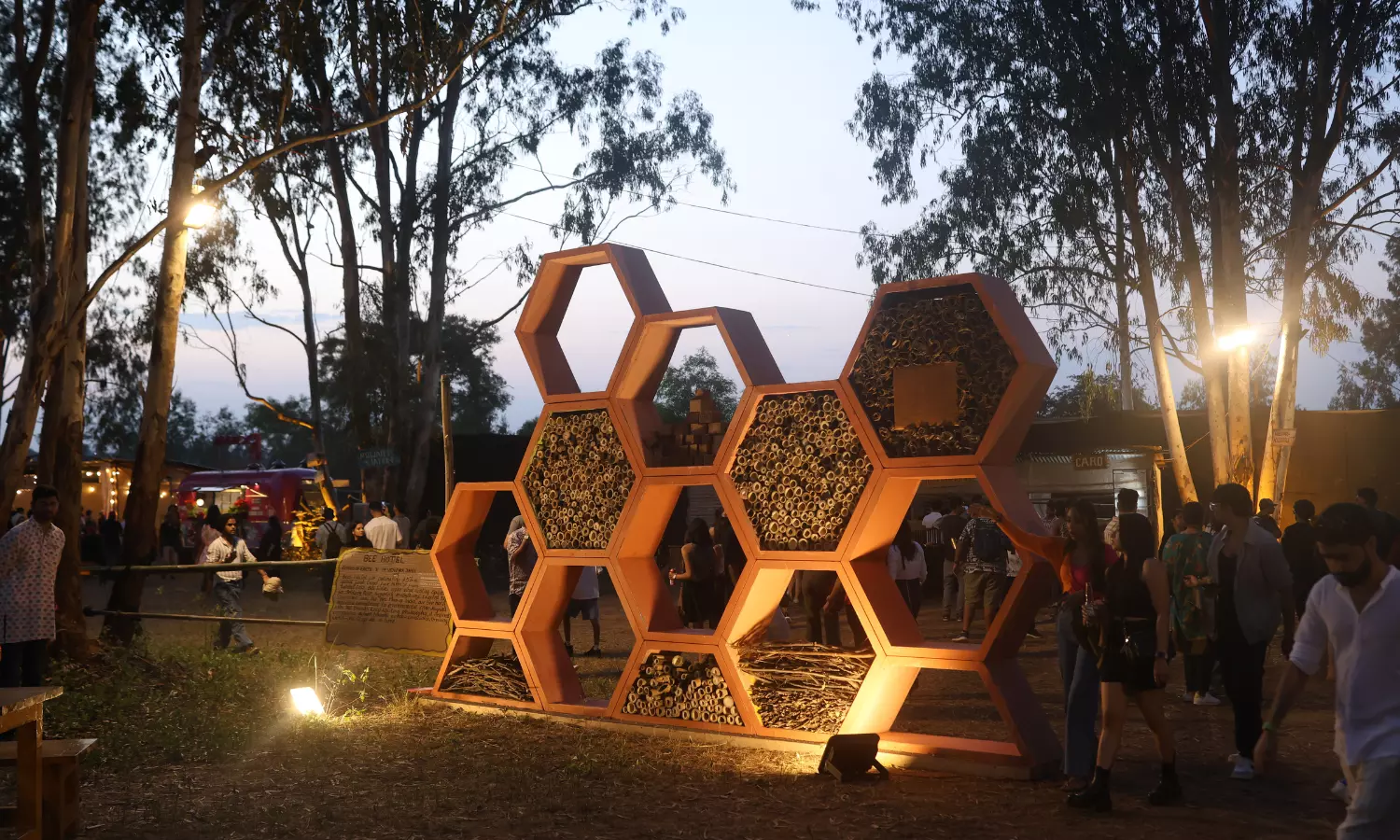Designing for a Sustainable Future: Devendra Jani's Insights

The Art of Bee Conservation: Devendra Jani's Innovative Approach (Photo by arrangement)
Devendra Jani, a techie turned bee conservationist, shares his passion for sustainable design and art. His installation at Echoes of Earth highlights the importance of pollinators and inspires eco-friendly practices.
What sparked your idea for the summer zone sanctuary installation, and how did you choose the specific materials and design elements?
The idea for the Summer Zone Sanctuary installation was sparked by my passion for native Bee conservation and the critical role bees play in our ecosystem. I chose to create a bee hotel to support solitary native bees, which are vital for pollination and biodiversity. Everyone thought Bees live in one big hives. Not many knew that there are solitary native bees who shelter in old wood, mud, Bamboo, twigs and hay. These native bees do more pollination than the honeybees we know. The materials—bamboo, sticks, wood, logs, and mud—were selected for their natural properties and sustainability, providing an ideal habitat for these solitary bees. The design elements were inspired by the need to create a functional yet aesthetically pleasing structure that aligns with the festival's green and artistic theme. Overall, the Bee Hotel installation aims to raise awareness about the importance of bees for our food security and human existence.
Can you tell us more about the importance of pollinators and how your installation highlights their role in our ecosystem?
More than 80% of the food we humans eat is all thanks to the Pollination service by Bees. If there were no Bees you will not get your Coffee, Strawberry, Almonds and much more. Pollinators, such as bees, are essential for the reproduction of many plants, including those that produce fruits, vegetables, and nuts, making them crucial for our food supply. They contribute to biodiversity by helping plants reproduce, which in turn supports other wildlife. My Bee Hotel installation highlights their role by providing a habitat for solitary native bees, emphasizing their importance over honey bees in pollination. The bee hotel serves as an educational tool, demonstrating how simple structures can support these vital insects. By raising awareness, the installation encourages people to take action in their own gardens and communities to protect and support pollinators.
How do you see your artwork contributing to the broader conversation around sustainability and environmentalism?
My artwork demonstrates how creative solutions can address ecological challenges. The bee hotel installation showcases the importance of pollinators and encourages sustainable practices by using natural, eco-friendly materials. In the past, human settlements naturally supported native bee habitats with wood logs stored for fuel and mud walls. Cities with cement walls, no old wood, and paved roads, have diminished Bee habitats. Bee Hotel serves as a tangible example of how art can intersect with environmental advocacy, inspiring others to think about their impact on the planet. By raising awareness and sparking conversations, the installation promotes a deeper understanding of the interconnectedness of all living things and the need to protect our natural world. Ultimately, it aims to inspire action towards a more sustainable and environmentally conscious future.Youths and Kids who visited there were awe struck and assured their support for the cause.
What challenges did you face in creating an immersive and engaging experience for festival-goers, and how did you overcome them?
Creating an immersive and engaging experience for festival-goers posed several challenges, including tight timelines and the large size of the installation. I travelled from Pune to Bangalore for this installation set-up. Sourcing the right materials was particularly difficult, as bees are very selective about artificial materials. To overcome these challenges, we meticulously planned each step and collaborated with the Echoes of Earth team to ensure local suppliers’ timely delivery of eco-friendly materials like bamboo, sticks, wood logs, and mud. Additionally, I engaged volunteers to help with the construction, ensuring the installation stayed on schedule. By focusing on natural materials and involving the community, I was able to create an installation that was both functional and visually appealing, enhancing the festival experience.
Can you share any personal experiences or insights that have shaped your approach to sustainable design and art?
My approach to sustainable design and art has been profoundly shaped by observing the natural world, where everything is reused and has no adverse impact. One striking example is how bees make their own Wax to construct hives. When they leave, the old wax is consumed by wax moth larvae, which then metamorphose into beautiful, winged moths. This cycle ensures nothing is wasted, and the end result is always harmonious and beneficial to the ecosystem. In contrast, human activities often leave behind plastic waste and other pollutants. This insight has driven me to prioritize eco-friendly materials and practices in my work, aiming to minimize environmental impact and inspire others to appreciate and emulate nature's sustainable processes.
How does this collaboration with Johnnie Walker Refreshing Mixer Non-Alcoholic and Echoes of Earth align with your artistic vision and values?
This collaboration with Johnnie Walker Refreshing Mixer Non-Alcoholic and Echoes of Earth aligns seamlessly with my artistic vision and values. Johnnie Walker’s “Keep Walking” philosophy resonates with my commitment to sustainability and environmental stewardship. My dream is for my child and future generations to have enough food and live in harmony with nature, which keeps me motivated to keep walking towards a greener future. Echoes of Earth, being a unique green music festival, provides the perfect platform to discuss my innovative bee conservation efforts, justifying my title of “Mr. Bee of India.” This partnership allows me to amplify my message and inspire others to embrace eco-friendly practices.
( Source : Deccan Chronicle )
Next Story

